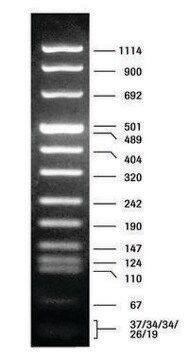L9516
Lipopolysaccharides (rough strains) from Salmonella enterica serotype typhimurium SL1181
Sinonimo/i:
LPS
Autenticatiper visualizzare i prezzi riservati alla tua organizzazione & contrattuali
About This Item
Numero MDL:
Codice UNSPSC:
12352201
Prodotti consigliati
Origine biologica
Salmonella enterica (Serotype typhimurium SL1181)
Forma fisica
lyophilized powder
Impurezze
≤5% Protein (Lowry)
Condizioni di spedizione
ambient
Temperatura di conservazione
2-8°C
Descrizione generale
This product is phenol:chloroform:petroleum ether extracted from Salmonella typhimurium strain SL1181. The source strain is from a private collection. This LPS has been used as a negative control for antibody binding to LPS.
Azioni biochim/fisiol
Lipopolysaccharides (LPS) are localized in the outer layer of the membrane and are, in noncapsulated strains, exposed on the cell surface. They contribute to the integrity of the outer membrane, and protect the cell against the action of bile salts and lipophilic antibiotics.
Nota sulla preparazione
Prepared by phenol-chloroform-petroleum ether extraction.
The product is soluble in water (5 mg/ml) or cell culture medium (1 mg/ml) yielding a hazy, faint yellow solution. A more concentrated, though still hazy, solution (20 mg/ml) has been achieved in aqueous saline after vortexing and warming to 70-80 oC. Lipopolysaccharides are molecules that form micelles in every solvent. Hazy solutions are observed in water and phosphate buffered saline. Organic solvents do not give clearer solutions. Methanol yields a turbid suspension with floaters, while water yields a homogeneously hazy solution.
The product is soluble in water (5 mg/ml) or cell culture medium (1 mg/ml) yielding a hazy, faint yellow solution. A more concentrated, though still hazy, solution (20 mg/ml) has been achieved in aqueous saline after vortexing and warming to 70-80 oC. Lipopolysaccharides are molecules that form micelles in every solvent. Hazy solutions are observed in water and phosphate buffered saline. Organic solvents do not give clearer solutions. Methanol yields a turbid suspension with floaters, while water yields a homogeneously hazy solution.
Altre note
To gain a comprehensive understanding of our extensive range of Lipopolysaccharides for your research, we encourage you to visit our Carbohydrates Category page.
Prodotti correlati
N° Catalogo
Descrizione
Determinazione del prezzo
Codice della classe di stoccaggio
13 - Non Combustible Solids
Classe di pericolosità dell'acqua (WGK)
WGK 3
Punto d’infiammabilità (°F)
Not applicable
Punto d’infiammabilità (°C)
Not applicable
Dispositivi di protezione individuale
Eyeshields, Gloves, type N95 (US)
Certificati d'analisi (COA)
Cerca il Certificati d'analisi (COA) digitando il numero di lotto/batch corrispondente. I numeri di lotto o di batch sono stampati sull'etichetta dei prodotti dopo la parola ‘Lotto’ o ‘Batch’.
Possiedi già questo prodotto?
I documenti relativi ai prodotti acquistati recentemente sono disponibili nell’Archivio dei documenti.
I clienti hanno visto anche
Anthony R Geonnotti et al.
AIDS research and human retroviruses, 26(3), 279-291 (2010-03-12)
Bacterial lipopolysaccharide (endotoxin) is a frequent contaminant of biological specimens and is also known to be a potent inducer of beta-chemokines and other soluble factors that inhibit HIV-1 infection in vitro. Though lipopolysaccharide (LPS) has been shown to stimulate the
Revathi Shanmugasundaram et al.
Poultry science, 98(3), 1127-1133 (2018-10-17)
This study was conducted to identify the effects of 25-OH cholecalciferol supplementation to turkeys on the immune cells parameters, fecal coccidial oocyst shedding, macrophage nitric oxide production, T regulatory cell cytokine production, and production parameters during a coccidial challenge. A
Aurélie Le Page et al.
Journal of Alzheimer's disease : JAD, 60(1), 23-42 (2017-08-05)
The mechanisms of neurodegeneration in Alzheimer's disease (AD) remain under investigation. Alterations in the blood-brain barrier facilitate exchange of inflammatory mediators and immune cells between the brain and the periphery in AD. Here, we report analysis of phenotype and functions
Sandra Jansen et al.
Infection and immunity, 81(5), 1788-1797 (2013-03-13)
The expression and function of psoriasin in the brain have been insufficiently characterized. Here, we show the induction of psoriasin expression in the central nervous system (CNS) after bacterial and viral stimulation. We used a pneumococcal meningitis in vivo model
Il team dei nostri ricercatori vanta grande esperienza in tutte le aree della ricerca quali Life Science, scienza dei materiali, sintesi chimica, cromatografia, discipline analitiche, ecc..
Contatta l'Assistenza Tecnica.



